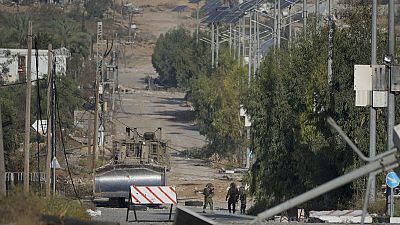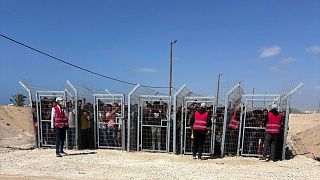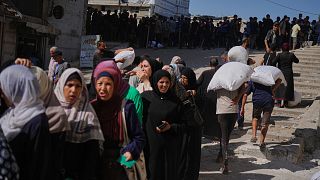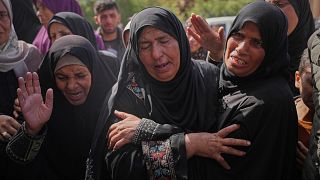Gaza
A four-day cease-fire between Israel and Hamas began Friday (Nov.24), allowing sorely needed aid to start flowing into Gaza and setting the stage for the release of dozens of hostages held by militants and Palestinians imprisoned by Israel.
There were no reports of fighting in the hours after the truce began. The deal offered some relief for Gaza’s 2.3 million people, who have endured weeks of Israeli bombardment and a near total siege, as well as for families in Israel worried about loved ones taken captive during Hamas’ Oct. 7 attack, which triggered the latest war in a decades-long political conflict.
The truce raised hopes of eventually winding down the conflict, which has seen Israel military response flatten vast swaths of Gaza, fueled a surge of violence against Palestinians in the occupied West Bank and stirred fears of a wider conflagration across the Middle East.
Israel, however, has said it is determined to resume its massive offensive once the cease-fire ends.
On Friday, it brought quiet after weeks in which Gaza saw heavy bombardment and artillery fire daily by Israel's Defence forces as well as street fighting as ground troops advanced through neighborhoods in the north. The last report of air raid sirens in response to rockets fired by Hama's fighters in Israeli towns near the territory came shortly after the truce took effect.
Not long after, four tankers with fuel and four with cooking gas entered the Gaza Strip from Egypt, Israel said.
Israel has agreed to allow the delivery of 130,000 liters (34,340 gallons) of fuel per day during the truce — still only a small portion of Gaza’s estimated daily needs of more than 1 million liters.
No fuel, no electricity, dwindling food supply
For most of the past seven weeks of war, Israel had barred the entry of fuel to Gaza, claiming it could be used by Hamas for military purposes — though it has occasionally allowed small amounts in.
U.N. aid agencies pushed back against the claim, saying fuel deliveries were closely supervised and urgently needed to avert a humanitarian catastrophe since fuel is required to run generators that power water treatment facilities, hospitals and other critical infrastructure.
The Israeli military dropped leaflets over southern Gaza, warning hundreds of thousands of displaced Palestinians who sought refuge there not to return to their homes in the territory’s north, the focus of Israel’s ground offensive.
Even though Israel warned that it would block such attempts, hundreds of Palestinians could be seen walking north Friday.
Two were shot and killed by Israeli troops and another 11 were wounded. An Associated Press journalist saw the two bodies and the wounded as they arrived at a hospital.
Sofian Abu Amer, who had fled Gaza City, said he decided to risk heading north to check on his home.
“We don’t have enough clothes, food and drinks,” he said. ”The situation is disastrous. It’s better for a person to die.”
During the cease-fire, Gaza’s ruling Hamas group pledged to free at least 50 of the about 240 hostages it and other militants took on Oct. 7. Hamas said Israel would free 150 Palestinian prisoners.
Both sides agreed to release women and children first, starting Friday afternoon. Israel said the deal calls for the truce to be extended an extra day for every additional 10 hostages freed.
Early in the day, ambulances were seen arriving at the Hatzerim air base in southern Israel, preparing for the release. Those freed will then be taken to hospitals for assessment and treatment, Israeli officials said.
The first hostages freed will be Israeli citizens, including some who have a second nationality, according to a Hamas official who spoke on condition of anonymity because he was not authorized to discuss the details with the media.
Israel’s Justice Ministry published a list of 300 prisoners eligible for release on Wednesday (Nov.22), mainly teenagers detained over the past year for rock-throwing and other minor offenses. Three Palestinian prisoners are expected to be released for every hostage freed.
The hope is that “momentum” from the deal will lead to an “end to this violence,” said Majed al-Ansari, a spokesman for the Foreign Ministry of Qatar, which served as a mediator along with the United States and Egypt.
But hours before it came into effect, Israeli Defense Minister Yoav Gallant was quoted telling troops that their respite would be short and that the war would resume with intensity for at least two more months.
Prime Minister Benjamin Netanyahu has also vowed to continue the war to destroy Hamas’ military capabilities, end its 16-year rule in Gaza and return all the hostages.












Go to video
Gaza’s scarcity of cash fuels desperation, sparks unusual trade
01:09
Israel bombs Houthi targets in Yemen, rebels respond with missile attack
01:00
Hamas gives 'positive' response to 60-day ceasefire proposal but says talks needed on implementation
01:30
Foreign Ministers of Oman and Egypt urge Washington and Tehran to resume negotiations
01:04
Israeli airstrike on popular Gaza City beach café kills at least 30
01:30
Trump calls for a Gaza ceasefire deal as some Palestinians are skeptical